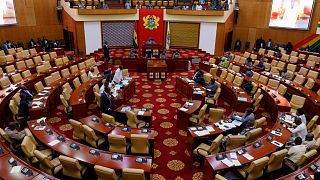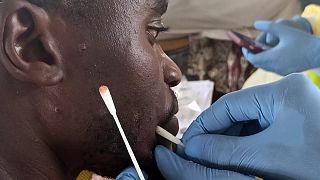Ghana
Anita Akpeere prepared fried rice in her kitchen in Ghana’s capital as a flurry of notifications for restaurant orders lit up apps on her phone. “I don’t think I could work without a phone in my line of business,” she said, as requests came in for her signature dish, a traditional fermented dumpling.
Internet-enabled phones have transformed many lives, but they can play a unique role in sub-Saharan Africa, where infrastructure and public services are among the world’s least developed, said Jenny Aker, a professor who studies the issue at Tufts University. A
t times, technology in Africa has leapfrogged gaps, including providing access to mobile money for people without bank accounts.
Despite growing mobile internet coverage on the continent of 1.3 billion people, just 25% of adults in sub-Saharan Africa have access to it, according to Claire Sibthorpe, head of digital inclusion at the U.K.-based mobile phone lobbying group GSMA. Expense is the main barrier.
The cheapest smartphone costs up to 95% of the monthly salary for the poorest 20% of the region’s population, Sibthorpe said. Yet many are not daunted. Many are finding means to buy one.
In Ghana, a vegetable farmer in a village called Atabu in Ghana’s Volta region****believes his business has the opportunity to expand now he's able to use the internet on his phone.
Cyril Fianyo is being shown how to navigate apps that interest him, including a third-party farming app called Cocoa Link that offers videos of planting techniques, weather information and details about the challenges of climate change affecting cocoa and other crops.
Previously he was restricted to calls and texts.
Now he's registered with a company called Uniti Networks.
Fianyo uses his identity card to register with the firm, he's put own a deposit of 340 Ghanaian Cedis ($25) for the smartphone and will pay the remaining 910 Cedis ($66) in installments.
Fianyo, who previously planted according to his intuition and rarely interacts with farming advisors is optimistic that the technology will help him increase his yields.
“I like searching on the phone so much,” he says.
“When I got it, I saw that this phone is very smart, so I don’t find it difficult to get some information that I want.”
At a training session in Hohoe market Uniti Network's Rita Quansah teaches a digital literacy workshop to a small group of men and women.
“For those of us who are market women we have an app called Oze. The Oze app is going to help you record your sales and your expenses,” she tells them.”
Hohoe is in Ghana’s volta region, where most of the population speaks Ewe.
Many of the people who benefit from Uniti Network's project lack formal education and don’t speak English.
Quansah explains, “there are video tutorials as well in the app in Ewe so that those who are not able to even understand the English will be able to watch the videos in their local language.”
The mobile lobby group GSMA says the mobile internet has enabled the sub-Saharan region to “leapfrog” certain infrastructure and service gaps by providing access to mobile money where formal banks have failed.
Less than 50% of the population has access to a bank account, according to the World Bank.
GSMA says mobile money contributed $170 billion, 8.1%, to sub-Saharan Africa’s GDP in 2022.
Though Uniti Networks aims to reach low income populations, the importance of mobile internet and apps to carrying out business in Ghana stretches across the socioeconomic spectrum.
Far from Hohoe, in the bustling capital Accra, Anita Akpeere runs a busy catering business with multiple employees.
She says it would not be possible without her phone.
“I get my orders from Instagram, Tiktok, Facebook, Whatsapp, and normal text messages,” she says.
As she scrolls through her Whatsapp, there are a seemingly endless amount of orders for kenkey, a traditional Ghanaian fermented dumpling.
“I don’t think I can work without a phone,” she says. “Because even if I’m asleep, I still get orders.”













Go to video
Evacuations begin: African citizens caught in Israel-Iran crossfire
Go to video
Ghana's former finance minister place on Interpol Red Notice list over corruption allegations
02:10
Accra city authorities renew battle against roadside trading
Go to video
Ghana moderators sue Meta over harm from reviewing extreme content
Go to video
Ghanaian Catholics gather for requiem mass in Accra in honour of Pope Francis
Go to video
Ghana: Tensions rise as chief justice Torkornoo suspended